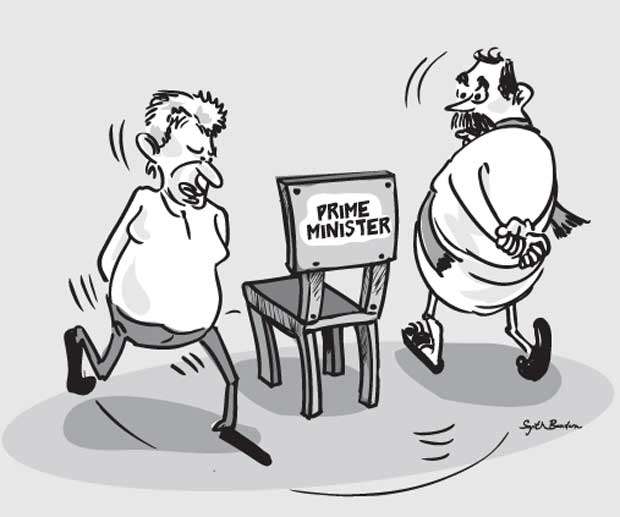Reply To:
Name - Reply Comment

 n late October 26, the Sri Lankan polity was thrown into crisis when in the aftermath of the ‘United People’s Freedom Alliance’ (UPFA) -- one of the parties within the governing ‘United National Front’ Government -- withdrawing from the governing coalition, President Maithripala Sirisena unexpectedly appointed the de facto leader of the Sri Lanka Podujana Peramuna (SLPP), former President Mahinda Rajapaksa as Prime Minister.
n late October 26, the Sri Lankan polity was thrown into crisis when in the aftermath of the ‘United People’s Freedom Alliance’ (UPFA) -- one of the parties within the governing ‘United National Front’ Government -- withdrawing from the governing coalition, President Maithripala Sirisena unexpectedly appointed the de facto leader of the Sri Lanka Podujana Peramuna (SLPP), former President Mahinda Rajapaksa as Prime Minister.
Accepting the premiership Rajapaksa claimed he was doing so in the interests of the country. The new premier supporters emphasised that when Rajapaksa was voted out of office in the aftermath of the 2015 presidential election, he accepted his defeat and left his residence at ‘Temple Trees’ by early morning, thus ensuring a peaceful transfer of power. They called on the earlier Premier Ranil Wickremesinghe to do the same and warned that failure to do so would force them to bring their supporters to “Temple Trees’ and force him out.
Simultaneously, President Sirisena issued notice of dismissal on Premier Wickremesinghe demanding he stepped down from office with immediate effect. He also issued gazette notifications proroguing parliament until November 16. Mr. Wickremesinghe rejected the presidential directive. He stressed that under the 19th Amendment to the Constitution, the President had no power to remove him from the post of Prime Minister. He emphasized he remained Prime Minister and would continue to act so until such time as his government maintained its majority in parliament.
Mr. Wickremesinghe’s colleagues and supporters warned that the other members of the ruling coalition stood behind the earlier Prime Minister’s decision and called on supporters to gather at ‘Temple Trees’ in a show of strength.
This situation brings to mind events which occurred in then ‘Belgian Congo’ in 1961
-- Congo, one of the world’s mineral rich countries -- where then President Mobutu and his Prime Minister Patrice Lumumba, were at loggerheads with one-another. The turmoil saw foreign intervention in the affairs of the Congo, the entry of foreign troops, the murder of Premier Lumumba, coups and counter coups which left nearly 100,000 dead. Worse was to follow, on the one hand, various regions of the original Congo broke away from the mother country. While the other Congo became the focal point of cold war adversaries -- the Soviet Union which backed the Premier and the US which backed the President. Over 100,000 died in the ensuing power struggle between the cold war powers and their local client rulers.
Today a fairly similar situation exists in this country. The rivalry between India and China has put this country squarely into the middle of their power games. China has invested heavily in this country and we are heavily indebted to them. Already theharbour at Magampura has been leased to a Chinese entity, while the airport at Mattala -- derogatively described as the emptiest airport in the world -- is under discussion for leasing to an Indian entity.
To make matters worse the Colombo Port which was to be developed in collaboration with the Indians under an agreement signed between the Indian Government and the Government of Sri Lanka is being opposed by the President, who also accused the Indian intelligence agency -- Research and Analysis Wing (RAW) -- of planning to assassinate him.
The US is concerned over the growing Chinese power in the Pacific and Indian Ocean region. In fact US Vice President has referred to the Mahagmpura port as a Chinese naval base.
The people of this country have been through two Janatha Vimukthi Perumana (JVP)-inspired bloody uprisings in 1971 and again in 1989. The country is just recovering from the bloodbath brought on by the terrorist outfit the Liberation Tigers of Tamil Eelam (LTTE) who were attempting to divide the country and left the nation’s economy in shambles. The people do not deserve this new political crisis brought on by politicians, which in the end, is nothing more than a power struggle, more aptly spelled out in the Sinhala idiom ‘balalobithwaya’.
Already the US and a number of countries have expressed concern at the expanding political crisis. The UK has warned its citizens of visiting the island -- a body blow to our tourism industry.
The last thing we need is to become entangled in international power struggles. Sadly, our politicians have been seen to put self before country, we would like to remind them of the lines in Sir Walter Scott’s ‘Lay of the last Minstrel’.
“Breathes there the man, with soul so dead, Who never to himself hath said, This is my own, my native land!